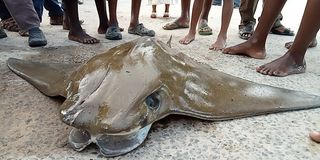Premium
Victims of marine wildlife attacks demand compensation

Shee Kombo being assisted to walk by colleagues Muhashiam Famau (right) and Aboud Mbwana. He was injured in the leg after being attacked by a stingray. He is appealing to KWS to compensate him.
Marine wildlife attack victims in Lamu County are blaming the State for neglecting them over their compensation.
The victims, mostly fishermen from Kiwayu, Ishakani, Mkokoni, Kiunga, Ndau, Faza, Pate, Kizingitini and other islands considered fishing hubs, complained that they were left with lifetime scars after being attacked by marine animals, mostly sharks, stingrays, starfish, stonefish and water snakes.
The Kiwayu Beach Management Unit (BMU) office says at least 200 cases involving injuries and deaths from such attacks are reported in Lamu East annually.
Kiwayu BMU chair Adam Lali told Nation.Africa on Monday that almost all the cases reported had not been compensated.
Most of those attacked by marine wildlife end up losing parts of their bodies, mostly limbs, he said.
Mr Lali accused the national government and the Kenya Wildlife Service (KWS) of selective concern where they only focus on other wildlife attacks such as those by lions, buffaloes and hyenas.
He said their efforts to seek help from the KWS office in the region had been in vain as they were ignored.
“My cousin almost lost his leg after being attacked by a stingray. He can’t walk at the moment. We also have a case of death from a shark attack at Kiwayu and no compensation has been initiated,” he said.
“We call upon KWS to consider victims of marine wildlife attacks. They should ensure they are compensated.”
Lamu BMU Network chairperson Mohamed Somo said most of those injured have been maimed for life and cannot do anything for themselves.
Families, he said, had fallen into poverty as breadwinners were incapacitated in the attacks.
Mr Somo asked that fishermen in Lamu be incorporated in State compensation programmes.
He said the county committee on compensation only focuses on victims of forest wildlife attacks and neglected marine ones.
“It’s bad seeing only victims of lion, hyena and buffalo attacks being compensated. They forget that there is wildlife in the water too. Let there be compensation for any form of wildlife attack, be it marine or land,” he said.
“Why must they compensate someone bitten by a snake in the bush and refuse to compensate a fisherman bitten by a snake in the ocean?”
Shee Kombo, 50, a fisherman in Kiwayu, was paralysed in his leg after he was bitten by a stingray on June 4 this year and is unable to walk.

A stingray fish caught in Lamu. Most cases of marine wildlife are caused by stingray attacks.
This was not the first stingray attack for Mr Kombo as he had also been bitten on June 17 last year.
He told journalists that his efforts to follow up with the KWS for compensation and treatment had been futile.
“You can imagine I was bitten by a stingray last June and stayed home for six months nursing the wound. I was bitten again this June and my leg is now paralysed. KWS aren’t talking about this,” he said.
Mohamed Bakari, another victim in Mkokoni, was bitten by a water snake one year ago and almost died.
“My entire right leg is paralysed because the snake bit me in the thigh. I have been to various hospitals but I can’t walk,” he said.
Aboud Mbwana, a survivor of a shark attack in Kiunga, urged Tourism and Wildlife CS Najib Balala to come to the region and look into their plight.
Muhashiam Famau said the County Wildlife Conservation and Compensation Committee was discriminating against victims of marine wildlife attacks and had failed to involve them in discussions on wildlife attacks and possible compensation.
In response, committee chairman Ali Shebwana denied that victims of marine wildlife attacks had not been considered for compensation.
He said that in June this year, the government released Sh8 million to Lamu County to compensate victims of wildlife attacks.
Mr Shebwana said three of the cases paid involved marine attacks.
He dismissed claims that 200 people are attacked by marine wildlife annually, noting that less than 10 cases had been reported since 2014.
The remaining cases will be cleared, he said.
“The cases are few but we are looking into them,” he said.
Lamu KWS Senior Warden Mathias Mwavita encouraged victims to report to his office once such attacks happen so that they can be verified, approved and compensation processes initiated.
He lamented that late reporting complicates compensation.





